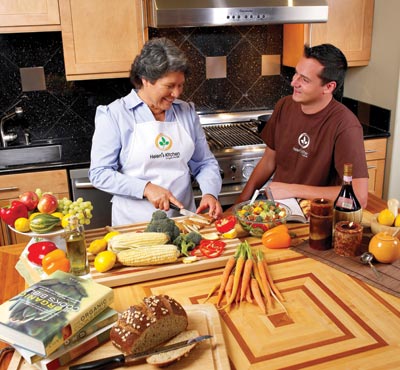
It used to be that vegetarian cuisine and Adventists shared a few common denominators. These common denominators had names such as Loma Linda and Worthington. We have loved (and may still love) our FriChik, Skallops, and Wham—incorporating them as meat replacements into a plethora of recipes designed to mimic the “real deal.” Some of these efforts have produced classic Adventist potluck fare, while others have gone the way of other food trends, happily disappearing into oblivion (does anyone remember Nuteena?). The idea behind distinctly different vegetarian cuisine has always been to create meals that made up in taste and nutrition what it lacked in meat and still make mouths water at the dinner table. These things are still key if one wishes to cultivate a healthful vegetarian lifestyle.
 However, as any Adventist who has feasted at the banquet table of an after-church fellowship meal knows, healthy vegetarian fare can sometimes be something of an oxymoron. Sure, the casserole was prepared sans chicken. But highly processed meat substitutes are often found bathed in a rich stew of “cream-of-something” soup baked to gooey glory with a thick coating of sharp Wisconsin cheddar. Of course, vegetarian cuisine varies from home to home and culture to culture, producing dishes that are certainly more healthful than the potluck specialties we may have enjoyed. And there certainly was a time when “veggie” food was something that only a certain pocket of the population understood, let alone relished.
However, as any Adventist who has feasted at the banquet table of an after-church fellowship meal knows, healthy vegetarian fare can sometimes be something of an oxymoron. Sure, the casserole was prepared sans chicken. But highly processed meat substitutes are often found bathed in a rich stew of “cream-of-something” soup baked to gooey glory with a thick coating of sharp Wisconsin cheddar. Of course, vegetarian cuisine varies from home to home and culture to culture, producing dishes that are certainly more healthful than the potluck specialties we may have enjoyed. And there certainly was a time when “veggie” food was something that only a certain pocket of the population understood, let alone relished.
That is not the case anymore. Vegetarian eaters are no longer confined to groupings of Adventists or devout Hindus. And vegetarian foods have come a long way in the consumer market since the days of nonmeat eaters having to explain their habits to waiters when trying to order a green salad—which for a time was your only vegetarian option when dining out.
Now restaurants from fast-food chains to Michelin star-rated hot spots all have vegetarian options readily available—and often highly recommended. Additionally, through stores such as Whole Foods, Sprouts, Roots, and other similar health-focused markets, quality vegetarian food has even found its way into the frozen prepared-meal genre. Are you a hungry vegetarian student needing to stock your freezer with microwavable meals, but know your mother would shudder if she knew all you subsisted on were chemical-laden macaroni-and-cheese meals? Are there any quick, convenient options for busy families that are stocked with vegetables, whole grains, and quality protein sources that do not come from animals?
Meet Helen’s Kitchen and the folks behind a company who are all about convenient, healthy, organic, and internationally inspired vegetarian cuisine.
And they are also Adventists.
 Tofu
TofuStephen Moore, president and CEO of Helen’s Kitchen, grew up eating very healthfully. According to his mother, Helen Moore, even the baby food he and his sister, Stephanie, ate was prepared at home from fresh fruits and vegetables she and her husband, Pastor Tony Moore, purchased from farmers markets and local sources. Helen, who was raised in Honduras, always had an interest in healthful living and highly valued the importance of good nutrition and exercise. “I was always tinkering around in the kitchen to find ways to get my family to enjoy healthy food,” she says. Stephen remembers his mother preparing their vegetarian meals from scratch—using only fresh and natural ingredients.1
Tofu soon became an ingredient that Helen added to her repertoire, transforming it from a somewhat boring but nutritious protein to something altogether different. Helen found a way to heighten the flavor and texture of tofu to make it something akin to a type of steak, and it became a key ingredient in sandwiches that were a huge hit with Stephen and many of his childhood friends.2 These tofu steaks became the product that launched Helen’s Kitchen.
While attending La Sierra University more than 10 years ago, Stephen took an entrepreneurship class with the dean of the School of Business, John Thomas. The assignment was to create a business plan for a product that could be ready to take to market. Tony and John encouraged Stephen to create a plan around his mother’s tofu steaks. “Being the college student that I was, I wrote the plan at the last minute, brought food in the next day, and fed the class,” laughs Stephen. But the plan and the product had promise. Thomas encouraged Stephen to spend the next quarter in directed study to see if he couldn’t develop Helen’s tofu steaks to the point that they could be readied for the consumer market. “He wrote a really great business plan and had great leadership,” says Thomas. “He was passionate about entrepreneurship and hungry about taking his product to market.”
But why tofu steaks? “At the time,” says Stephen, “we believed that it was a differentiated product, and everyone liked the health benefits of tofu. And so we thought that putting them in a frozen format would be something that consumers would like. And they did like it.”
Helen gave her son her blessing to use her name for the company with the caveat that the end product taste as good as it did coming out of her home kitchen. Space from Our Daily Bread bakery, which was run out of the Norwalk, California, Seventh-day Adventist Church, where Tony pastored, was leased, and the fledgling food company was launched. Gradually Stephen immersed himself in the natural products world and tested their product at natural foods expos. “At food product demonstrations we found that the majority of the people were wanting to have the tofu steaks in a meal, and so we created several of those that hit the market and did a lot better,” he adds.
From there they got interest from Whole Foods in Vancouver and launched in western Canada as well as in stores such as the Loma Linda Market in Loma Linda, California, and Clark’s Nutrition and Natural Foods Market—a chain of health-food stores in southern California, as well as a few local Whole Foods stores.
By 2005 the company was ready to move into a bigger space. “I got together with a family friend, and we decided to build a food plant down here [Irvine, California], so we built that out by 2006 and finally launched into the mainstream market in 2007,” Stephen explains.
Two years passed, and the company needed to produce more volume for the plant. So they eventually merged with a label formerly called Organic Bistro and formed a new line of frozen meals. After a consumer survey this line’s brand name was recently changed to Artisan Bistro. Both Artisan Bistro and Helen’s Kitchen are now produced at the same plant under the umbrella of a company called The Food Collective.3
Ironically, the very product that got Helen’s Kitchen on its way—her famous tofu steaks—was recently discontinued. “We could never get the production of it right where we could produce enough volume of it,” says Stephen. And according to Helen—who is the face of the brand and regularly interacts with consumers at store demonstrations and food expos—there was an outcry. “The consumers were dictating it all,” Stephen adds. “The market has also changed over time. There are a lot more people that are anti-soy, so we’ve diversified our meals to use other protein sources, such as beans, rice, and quinoa, because a lot of people are looking for things that are without soy.” Today Helen’s Kitchen frozen meals include a wide range of organic, gluten-free dishes from curries to burrito bowls to “melts.” Moving forward, Helen’s Kitchen is moving into the refrigerated market, with products such as vegetarian chorizo sausage and “grounds”—similar to vegeburger “meat”—which is the first organic and gluten-free product of its kind on the market, and comes fully flavored to just heat and eat.
Helen Moore’s cooking was so good her son developed a solid business from it. But the real Helen is also pretty special. Helen, as brand ambassador for the company, frequently travels to talk about Helen’s Kitchen and the Artisan Bistro lines, which are available throughout North America in health-food and regular grocery stores as well as at Costco. Helen’s Kitchen meals can also be found in Adventist Book Centers. Through this unique opportunity consumers get to meet the kind, unassuming woman whose family cooking inspired a rapidly growing culinary business. Helen uses these opportunities to do much more than just sell a wholesome, good-for-you product. Each visit with consumers—especially women—provides her with the chance to encourage them and talk about healthful living and the importance of eating right and exercise.
Many of her own recipes as well as family favorites from Stephen’s wife, Monique (who also works with the company), serve as the basis for the Helen’s Kitchen product line. So how does a family recipe become a ready-for-market product? “Usually we start with my mom or wife finding something they like,” says Stephen. “My mom will whip up recipes and bring them here, and everyone tries it [The Food Collective employs 55 people currently]. And if everyone likes it we move ahead to our research and development chef, who takes over and puts it into a formula.” All recipes are created at a 100 percent formula and scaled up, with many tweaks along the way. After that, the product must go through a round of certifications—essentially a four-month process—before it is ready for market. Then there is a test batch that goes through the production line at the plant, which can sometimes result in a complete revamp of quality-assurance processes for that product. “We cook all of our sauces and rice, and so with everything we make we try to get as close to a family meal as possible. We try to keep that homey flair to it,” adds Helen.
The food business is not an easy one, so for Helen and Stephen—members of the Orange Coast Seventh-day Adventist Church, also in Irvine—their faith certainly helps them. “Anything in food or retail is very, very difficult, but I know Mom’s always praying for me,” Stephen laughs as she smiles at him. Indeed, in the day-to-day happenings of keeping a business going in a competitive market, faith keeps this young entrepreneur focused and moving forward. As for Helen, her eyes light up when she recounts the many opportunities she’s been given to make a difference through their business.
“I have a big opportunity to try and educate [people] and encourage them on how to eat better,” she says. “It’s not just to sell my food, but also to help them see that I’m giving them the best kind of food they can buy for themselves, because I do think we have a great product. I tell them what I’m selling you today is not just a product, but who I am.” She smiles. “Then they ask, ‘Are you a Christian?’ and I say, ‘Oh, definitely. That’s a big part of who I am.’ I say to the Lord, ‘You know I’m doing a demo here today. Just radiate through me and help people to see that there is something different about me. I’m not giving a Bible study, but this is what I’m doing, and I want You to come through all of what I do.’ And people can tell a difference.”4n